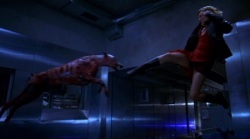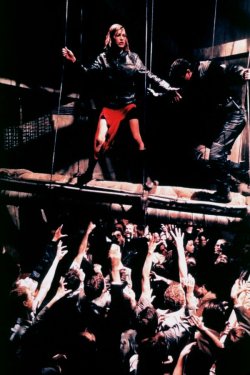Review: Resident Evil (2002)
 I managed to avoid this series for quite some time. It isn’t that I dislike zombie movies, video games, or Milla Jovovich’s, er, assets. It’s that video game adaptations typically suck. I’m sorry, that’s just the way things have always been, and probably will be most of the time. Most of what makes video games fun is the fact that the player is actively involved. Characters and story don’t have to be brilliant in order for players to enjoy them. By having to make constant decisions that affect gameplay, we are automatically actively engaged. Take away the element of control, and a great deal of the appeal is lost.
I managed to avoid this series for quite some time. It isn’t that I dislike zombie movies, video games, or Milla Jovovich’s, er, assets. It’s that video game adaptations typically suck. I’m sorry, that’s just the way things have always been, and probably will be most of the time. Most of what makes video games fun is the fact that the player is actively involved. Characters and story don’t have to be brilliant in order for players to enjoy them. By having to make constant decisions that affect gameplay, we are automatically actively engaged. Take away the element of control, and a great deal of the appeal is lost.
This is why the best video game movies are those that either merely utilize video game themes and style in crafting a larger film narrative (eg. Crank and Scott Pilgrim vs. the World) or recognize the inherent superficiality of most video games and make that part of the fun (eg. DOA: Dead or Alive). To act as though video games and film are equal storytelling mediums and what works for one will work for the other is to ignore the strengths and weaknesses of each. That’s like saying that because both the fire department and police department are designed to serve the public good, trying to put out a three-story blaze with a billy club and a badge will totally work. They might have similar goals, but they achieve them through very different means.
Paul W.S. Anderson apparently didn’t get the memo.
Resident Evil contains most of the main elements of the popular game series. There is a powerful corporation called Umbrella. They have engineered a virus that can reanimate dead cells, effectively bringing corpses back to life in the form of mindless flesh-hungry fiends. There’s an outbreak. Cue frantic fights for survival against hordes of zombies. In terms of general story elements, the film is a decent translation of the game franchise.
 What it isn’t, however, is a great movie. The plot follows Alice (Milla Jovovich), head of security for The Hive, an underground lab in which the Umbrella Corporation conducts top-secret genetic research. When we meet her, she’s regaining consciousness on the bathroom floor in a huge mansion, unable to remember who she is or how she got there. Along with a cop named Matt (whose presence is never explained), she teams up with a group of commandos to head into The Hive and override its computer system, codenamed Red Queen, which has effectively sealed off all exits. After all, if the Red Queen shut down a top-secret laboratory and killed everyone inside, it must be for no reason, right?
What it isn’t, however, is a great movie. The plot follows Alice (Milla Jovovich), head of security for The Hive, an underground lab in which the Umbrella Corporation conducts top-secret genetic research. When we meet her, she’s regaining consciousness on the bathroom floor in a huge mansion, unable to remember who she is or how she got there. Along with a cop named Matt (whose presence is never explained), she teams up with a group of commandos to head into The Hive and override its computer system, codenamed Red Queen, which has effectively sealed off all exits. After all, if the Red Queen shut down a top-secret laboratory and killed everyone inside, it must be for no reason, right?
Though some of its action scenes are inventive, Resident Evil is ultimately a mediocre film at best because it never develops its characters beyond the obvious. What? You mean Alice can’t immediately figure out what the situation is and who unleashed a killer virus because she has amnesia? Well, how convenient! Kudos to Anderson for trying to keep things mysterious and gradually unveil new twists, but this is a sloppy way to do it. While over time Alice remembers more and more about what she and others did – actions we get to see through the use of slightly over-exposed and jarringly-edited flashback sequences, since apparently without a visual cue we’d be too stupid to realize we weren’t in the present anymore - we never get a sense of who these characters truly are. They have no compelling backgrounds. No camaraderie with which I can sympathize. No personalities beyond a desire to complete their mission and get out alive. In other words, there’s nothing to make me care about them as anything other than a fresh meal. There isn’t much to separate them from the robot-like zombies other than the ability to talk, and when they do that they’re usually just stating what we already know, with lines like, “She bit me!” and, “Those people used to work here.” Thanks, characters! I was having trouble seeing what was right in front of my face!
 The acting is mostly standard fare, though Michelle Rodriguez does some decent work with some pretty terrible dialogue. Jovovich also shines when she’s too busy kicking zombie ass to deal with a lackluster script, bringing a real presence to the action through the form of an icy glare and well-executed martial arts. Unfortunately, the action doesn’t have much variety beyond running and shooting zombies in the face, and whenever it does it’s ruined by inept filmmaking. Take a scene in which Alice encounters a pack of infected dogs, for example. Jovovich does a fine job simultaneously portraying both the character’s aggression and sense of confusion about how she’s capable of such acrobatic feats, and the scene flows at a brisk and intense pace as she kicks and shoots her way through canine attackers. But then, just as she’s defeated the last one, a heavy metal guitar riff plays for a few seconds before abruptly disappearing. It’s like Anderson felt the need to provide an audio cue, as if to confirm, “Yeah, that was awesome!” We know it was awesome. We saw it. No need to rub it in. With that single decision, I went from feeling like I was watching a movie to feeling like I was watching a television commercial – it’s practically begging me to like it.
The acting is mostly standard fare, though Michelle Rodriguez does some decent work with some pretty terrible dialogue. Jovovich also shines when she’s too busy kicking zombie ass to deal with a lackluster script, bringing a real presence to the action through the form of an icy glare and well-executed martial arts. Unfortunately, the action doesn’t have much variety beyond running and shooting zombies in the face, and whenever it does it’s ruined by inept filmmaking. Take a scene in which Alice encounters a pack of infected dogs, for example. Jovovich does a fine job simultaneously portraying both the character’s aggression and sense of confusion about how she’s capable of such acrobatic feats, and the scene flows at a brisk and intense pace as she kicks and shoots her way through canine attackers. But then, just as she’s defeated the last one, a heavy metal guitar riff plays for a few seconds before abruptly disappearing. It’s like Anderson felt the need to provide an audio cue, as if to confirm, “Yeah, that was awesome!” We know it was awesome. We saw it. No need to rub it in. With that single decision, I went from feeling like I was watching a movie to feeling like I was watching a television commercial – it’s practically begging me to like it.
 Indeed, that’s what a great deal of the film feels like: an insecure kid who will do anything to be popular. A flashback structure. Random bouts of slow-motion action. A double cross. These aren’t innovative story and stylistic choices. They’re formulaic and stale trends, the “what’s hot” of an ADD generation. While these things have all been used effectively in other films, here they’re so poorly executed that the film becomes more and more of a chore to watch as it goes on. I don’t care whether or not the characters die because I don’t know anything about them. I don’t care about the action scenes because I’ve seen this type of thing before, and done better.
Indeed, that’s what a great deal of the film feels like: an insecure kid who will do anything to be popular. A flashback structure. Random bouts of slow-motion action. A double cross. These aren’t innovative story and stylistic choices. They’re formulaic and stale trends, the “what’s hot” of an ADD generation. While these things have all been used effectively in other films, here they’re so poorly executed that the film becomes more and more of a chore to watch as it goes on. I don’t care whether or not the characters die because I don’t know anything about them. I don’t care about the action scenes because I’ve seen this type of thing before, and done better.
That isn’t to say everything about Resident Evil is a failure. What makes things even more frustrating is that there actually is a lot of potential. The few snippets of character information we get are interesting enough to inspire decent developments. The corporate structure of Umbrella and Alice’s involvement with them could make for a more interesting protagonist, were we given further details. The opening and closing scenes are well put-together and even made me excited to see what happens next. But the first act of the film is so desperate to be mysterious and kinetic that it fails to give the audience anything with which it can emotionally connect. If we want Alice and the team to live, it’s only out of respect for human life, not because we actually like them.
Ultimately, Resident Evil is a so-so film that could have been a legitimately good genre flick with better writing and more innovative direction. There are seeds of a good mythology present, they just aren’t allowed to bloom. By focusing so much on the action scenes, Anderson forgot that part of what makes the games so effective is their use of mood and atmosphere. It’s okay to pause and let the audience catch their breath, get to know more about the characters and just feel creepy between waves of zombies. Sometimes silence is scarier than gunfire, and the more terrifying enemy is the person sitting a few feet away.